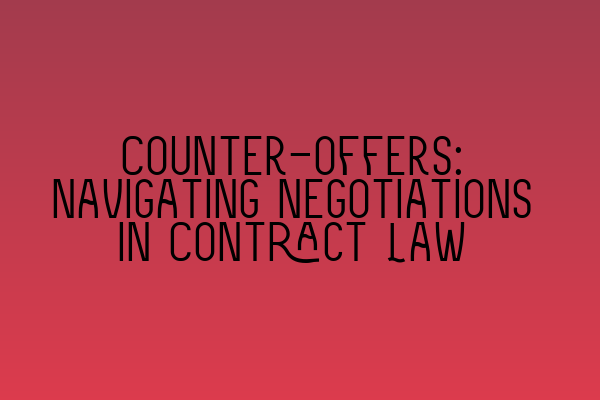Counter-offers: Navigating Negotiations in Contract Law
When it comes to contract negotiations, counter-offers can play a crucial role in the process. Understanding the concept of counter-offers and how they impact contract law is essential for solicitors and legal professionals. In this article, we will explore the intricacies of counter-offers, their legal implications, and provide insights on how to navigate negotiations effectively.
What is a Counter-offer?
In contract law, a counter-offer occurs when one party responds to an offer made by another party with a proposed alteration or different terms. Essentially, it is when the offeree rejects the original offer and presents a new offer, which effectively terminates the original offer.
It is important to note that a counter-offer is different from a mere request for additional information or clarification. A true counter-offer creates a new offer altogether, replacing the original terms proposed by the initial offeror.
Legal Implications of Counter-offers
Counter-offers have various legal implications that can significantly impact the contractual agreement between the parties involved. The key legal implications to consider are:
- Termination of Original Offer: When a counter-offer is made, the original offer is automatically terminated. The parties are no longer bound by the terms of the initial offer.
- Mirror Image Rule: The mirror image rule states that an acceptance must mirror the terms of the offer without any modifications. A counter-offer breaks this rule as it introduces new or altered terms, making it a rejection rather than an acceptance.
- Revocation of Counter-offer: If the original offeror receives a counter-offer and wishes to accept it, they must communicate their acceptance to the offeree. However, once a counter-offer is made, the offeree can revoke it at any time before the acceptance is communicated.
- Formation of a New Contract: If the original offeror accepts the counter-offer, a new contract is formed based on the terms of the counter-offer. This new contract overrides any previous offers or negotiations that took place.
Navigating Negotiations with Counter-offers
When navigating negotiations that involve counter-offers, there are several strategies and considerations that can help solicitors and legal professionals effectively represent their clients. Here are some key points to keep in mind:
- Clear Communication: It is important to ensure that all communication regarding counter-offers is clear and unambiguous. Both parties should clearly express their intentions, proposed terms, and any modifications to avoid misunderstandings or disputes.
- Understanding Client Priorities: Solicitors should thoroughly understand their clients’ priorities and objectives in the negotiation process. This knowledge allows them to advocate for terms and conditions that align with their clients’ best interests.
- Assessing Legal Risks: Evaluating the legal risks associated with counter-offers allows solicitors to provide sound advice to their clients. By assessing potential legal consequences and implications, solicitors can help clients make informed decisions during negotiations.
- Negotiation Tactics: Employing effective negotiation tactics can help solicitors achieve favorable outcomes for their clients. Strategies such as compromise, collaboration, and creative problem-solving can bridge gaps between parties and lead to mutually beneficial agreements.
Successfully navigating negotiations involving counter-offers requires a comprehensive understanding of contract law and the ability to advocate for clients’ interests effectively.
For sample papers and practice resources to enhance your legal knowledge and prepare for the SQE exam, consider visiting SQE Sample Papers: Practice for Exam Success. Mastering key concepts in SQE1 and SQE2 is crucial for a successful legal career, and you can find valuable insights in Focus Areas in SQE1 and SQE2: Mastering Key Concepts.
Adjusting your SQE strategy based on mock performance is essential for exam success. Learn how to analyze your performance and make necessary improvements in Adjusting Your SQE Strategy Based on Mock Performance. Additionally, engaging in peer discussions and receiving feedback can enhance your learning experience. Check out Peer Discussions Post-Mock: Learning from Collaboration and Feedback to learn more.
To experience a realistic SQE exam environment and assess your readiness, interactive mock tests are invaluable. Explore Interactive Mock Tests for a Realistic SQE Experience and take your preparation to the next level.
Counter-offers are an integral part of contract negotiations, and understanding the legal implications and strategies involved is paramount for solicitors and legal professionals. By staying informed, applying effective negotiation techniques, and prioritizing clients’ interests, solicitors can navigate counter-offers successfully and achieve favorable outcomes for their clients.
